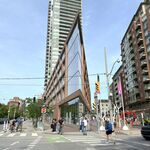Dinged for density
Councillors tackle tax bias that penalizes urbanites for efficient living
By Mike Smith
Proposed lot levy would tax properties by sidewalk frontage instead of desirability of ’hood.
Nothing wears the enamel off my teeth like people calling themselves (capital-T) “Taxpayers.â€
It’s not that it’s a sad sort of identity, or that those who proclaim it most proudly seem to do so while decrying taxes on principle.
It’s the way these folks love using the identity for political capital. And since they’re usually in the highest bracket of taxpayers, their tax resistance theatrics become just another form of conspicuous consumption.
And score one for the tax warriors after the owners of 12 downtown office towers won an appeal of their tax rates. The Assessment Review Board ruled February 25 that they are owed millions in refunds.
Of course, the system is a mess. All other assessments will rise this year, after a freeze imposed by the province following Ombudsman André Marin’s slam of the province’s Municipal Property Assessment Corporation is lifted. Reform, though promised, is unlikely to occur.
So if you’re a small business, a homeowner or a renter, you can expect your tax increases to make up the balance of city income lost from bank tower revenue. Cue the gnashing of teeth. But the immediate problem isn’t that we’re taxed; it’s how.
Current (or market) value assessment, which sets tax rates based on property values, is a headache for middle-income earners and sometimes an outright disaster for low-income people whose neighbourhoods become hot spots.
But that’s not all. “Given the dynamics of Toronto’s housing market, the downtown is penalized and the suburbs are relieved,†says Councillor Gord Perks (Parkdale).
“For the exact same building on Roncesvalles as one in Scarborough, you pay more taxes even though, because of the population density, it’s cheaper for us to deliver services.â€
As you may have guessed, there’s an ecological angle: value assessment tends to reward sprawl. Is there a fairer, greener way to tax municipally?
Some councillors think so and are advocating what’s known as a lot levy, or a parcel tax. This would tax properties by square footage or sidewalk frontage – measures that would tie taxation to the real cost of service.
It’s a proposal backed by Adam Vaughan – whose Trinity-Spadina constituents will likely feel the brunt of tax hikes when new assessments come in. The current system, he says, offers no premium for choosing a property that conserves resources.
“If you’re close to a subway line,†he says, “your property values go up. Therefore, your taxes go up. Therefore, you’re paying twice for the TTC.†Not good policy on the part of a province that says it wants to find regional transit solutions.
Vaughan doesn’t think the city should wait for provincial reform to introduce lot taxes. “That’s why I supported new taxation – broadening the base of our taxing powers to get a whole new range of taxes that have nothing to do with real estate value.â€
Of course, that’s the point of the land transfer tax. But that only kicks in when a property is sold. And, adds Vaughan, it’s based on a choice: you choose to buy. The same is true, he says, of garbage fees.
“Essentially, the [idea] is to send two different tax bills to your average house: one your real estate value and the other a group of taxes that are attached to the way you use your property,†or he suggests, the very property you decide to buy. “We’re building a set of choices that are environmentally progressive.â€
Ah, but here’s the rub. Perceived downtown eco-snobbery aside, the high real estate market is one of the key factors driving people to the suburbs. Forty years ago, suburbia was a lifestyle choice. Now – as income mapping will tell you – it’s more likely to be the result of lack of means.
From a downtown vantage point, the parcel approach looks like rewarding responsibility. But from the inner suburbs it could feel like punishment for being too poor to buy downtown or for keeping your family in Toronto when you could have moved to Aurora.
Vaughan acknowledges it’s a challenge, and says the key will be to make sure new taxation is seen to be im-proving services.
“The irony is that the burbs aren’t efficient places for the middle class to live any more,†he says.
“We’ve got a real challenge in how to retrofit the suburbs. That’s what Transit City’s about. But how do you make those postwar suburbs that were designed for the car work? There’s not a city in North America that’s figured out how to revive those areas.â€
Perks, another supporter of the lot levy concept, fears a failure to remake the burbs would have far-reaching implications.
“There are ecological consequences, there are balance-sheet consequences to governments, and I think there are conviviality issues,†he says. “There’s a social consequence as well, which you’ll see in terms of less social cohesion, more crime, more alienation.â€
But why the resistance to change, since it’s not the province that would be affected financially? The answer is probably that suburban and GTA dwellers would punish Libs electorally.
When I ask Perks to comment on this, he goes quiet for a moment, then tells me that the first election in Ontario in which more votes were cast in low-density ridings than in high-density ones was 1999. That was the year Mike Harris was re-elected.
Careful what you wish for, Taxpayer.





